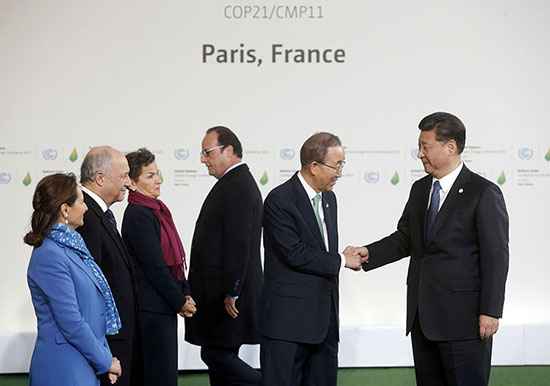Prepare now for another major El Nino
Updated: 2015-12-11 08:57
By Axel Van Trotsenburg(China Daily)
|
|||||||||
 |
|
United Nations Secretary General Ban Ki-moon, accompanied by French Ecology Minister Segolene Royal (L), French Foreign Affairs Laurent Fabius (2ndL), Secretary of the UN Framework Convention on Climate change Christiana Figueres(3rdL) and French President Francois Hollande (3rdR) , welcomes Chinese President Xi Jinping as he arrives for the opening day of the World Climate Change Conference 2015 (COP21) at Le Bourget, near Paris, France, November 30, 2015. [Photo/Agencies] |
The latest cyclical warming of Pacific Ocean waters, first observed centuries ago and formally tracked since 1950, began earlier this year and has already been felt across Asia, Africa and Latin America.
Weather experts predict this El Nino will continue into the spring of 2016 and could wreak havoc, because climate change is likely to exacerbate the intensity of storms and flooding in some places and of severe drought and water shortages in others. El Nino's impacts are global, with heavy rain and severe flooding expected in South America and scorching weather and drought conditions likely in the Horn of Africa region.
The risk is especially great for East Asia-Pacific countries that are highly vulnerable to altered weather patterns because of climate change. This year will likely be the hottest ever recorded, increasing the El Nino effect caused by weakened trade winds that fail to push warmer Pacific Ocean waters to the west.
We know what the potential effects might be. In 1997 and 1998, the strongest El Nino on record led to the deaths of 23,000 people from natural disasters, increased poverty rates by 15 percent in some countries and cost governments up to $45 billion owing to severe storms, droughts and other effects.
Such a global challenge calls for a global response - with coordinated efforts by governments, international institutions such as the World Bank, relief agencies and communities - to minimize the death and destruction from natural catastrophes while building more resilient societies.
Related Stories
Obama, Modi vow to secure 'strong' climate change agreement 2015-12-09 09:10
Asia Pacific: Response to climate change 2015-12-08 17:13
China's climate-change envoy stresses South-South cooperation 2015-12-08 00:18
Paris summit highlights need for urgency on climate change 2015-12-04 09:09
Today's Top News
Inspectors to cover all of military
Britons embrace 'Super Thursday' elections
Campaign spreads Chinese cooking in the UK
Trump to aim all guns at Hillary Clinton
Labour set to take London after bitter campaign
Labour candidate favourite for London mayor
Fossil footprints bring dinosaurs to life
Buffett optimistic on China's economic transition
Hot Topics
Lunar probe , China growth forecasts, Emission rules get tougher, China seen through 'colored lens', International board,
Editor's Picks

|

|

|

|

|

|







